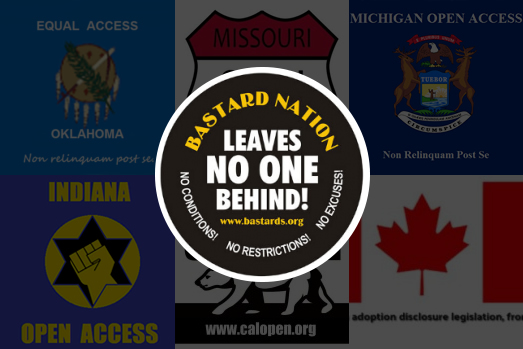IV. The Adoption Reform Movement
Although individual voices had been raised against the sealed records system in earlier decades, the 1970s saw the true beginning of the adoption reform movement in the United States as adoptees who had been born into that system came of age. The Adoptees’ Liberty Movement Association (ALMA) was founded by adoptee Florence Fisher in 1971, an event that sparked the establishment of dozens of search and support as well as activist groups nationwide. ALMA strongly asserted that adoptees had an absolute right to their records, eventually filing a lawsuit challenging the sealed records law of New York State in 1977. Its failure saw the retreat of that group from open records activism to search and support. ALMA has a web site at: http://www.almasociety.org
The American Adoption Congress (AAC) was formed in 1978 as an umbrella organization for the proliferation of search and support groups that had sprung up in the 1970s. The AAC’s primary mission has been the education of American society to the value of greater openness in the adoption process, including not only open records for adult adoptees but also open adoptions, agreements by which birth and adoptive parents and their minor children maintain some level of contact. It has also addressed the issues of birth father rights, surrogacy and donor insemination. While its legislative policy statement indicates its support for unconditional access legislation, it also supports legislation that “in the judgment of the Legislative Committee and the Board, represents realistic progress for a particular state.” In practice, this has led to AAC support for veto, intermediary and registry bills as well as other legislation that violates adoptee rights. Its ranks, once largely made up of adoptees, now include a substantial population of confidential intermediaries, social workers, paid searchers and mental health professionals, leading some to question its ability to stay true to its professed desire to represent the interests of adoptees, birth parents and adoptive parents. Basing its argument on psychological need and pursuing a statistical goal of the greatest amount of information for the greatest number of adoptees, the AAC appears to be placing the desire of some adoptees for reunions ahead of universally applicable civil rights. While its legislative strategy is deeply flawed, the AAC has nevertheless made an important contribution to adoption reform by consistently arguing for more openness in the adoption process. One hopes that its commitment to more humane standards in adoption practice will not waver. The AAC has a website at: http://www.americanadoptioncongress.org
The most important birth parents’ organization is Concerned United Birthparents (CUB), founded by Lee Campbell in 1976. CUB gave a voice to those who had been silenced by the shame of unwed pregnancy and sealed records, in addition to advocating for open records. CUB has often led the way in fighting reactionary legislation such as the Uniform Adoption Act. Although CUB had for decades failed to support legislation which did not open records to birth parents as well as adoptees, under new leadership it joined California Open, a coalition which lobbied an adoptee rights bill. CUB has a website at: http://www.cubirthparents.org




